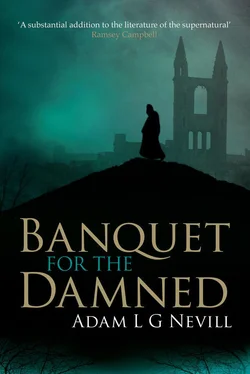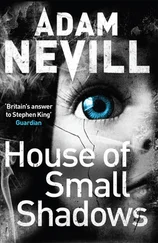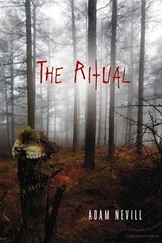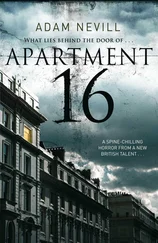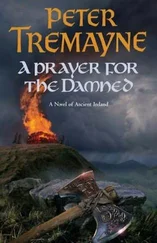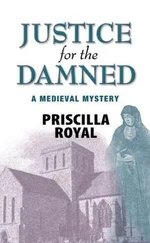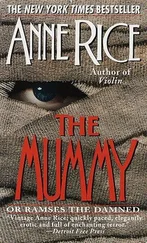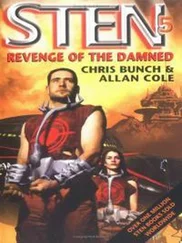Down on the desolate street, he shivers. A cold breeze sweeps up from the west and blows a piece of litter across his unlaced boots. His head is suddenly, mercifully clear; the nausea and dizziness pass, but his every nerve hums like a live wire. Tucking his head down, Hart runs across the road, away from the flat, at a slanting angle toward Grey Friar's Street — the nearest exit from Market Street. He drops to a crouch at the corner of Grey Friar's, inside the canopy of a building society.
He zips his jacket up to his throat and looks for somewhere else he can hide. But there isn't time. A car approaches from the top of Market Street by the monument. There are no headlights warning of its approach. It becomes a long black saloon that crawls to the curb outside his flat. The door to the flat is still open and he has left all the lights on upstairs. He can see the orangey glow they make from the top of the staircase. He pushes himself as far inside the entrance to the building society as he can. The tiles on the floor freeze his hands; the glass feels cold enough to stick his face to the windows.
He can hear the engine of the car idling. There is the sound of two doors opening and being slammed shut, followed by a scuffle of heels on the pavement.
An age seems to drag by and Hart remains still and silent, shivering with cold and the fear he can taste like a mineral in his mouth. Whoever is now inside his flat is taking their time. He begins to wonder if it is the police. Maybe he's been turned over to the law and plainclothes detectives are tossing the place right now. He tries to force the theory to make sense. He's been spouting off about missing students and it is only a matter of time before the disappearances of Rick, Mike and Maria are investigated. He's met Mike, interrogated Rick's roommate, and spoken to Maria and her boyfriend on the phone. Every path leads to him. But why didn't the police come straight away? And are the local constabulary capable of psychic attack? Because that's what it was, up there in the flat, where he thought himself safe with a couch against the door. He tries to banish the residue of the visions that assaulted him inside the place he knew as home. Thank sweet Jesus he left when he did.
Hart takes one tentative peek out of the doorway, but draws back quickly at the sound of hurried footsteps descending the stairs of the flat. They scuff off the tarmac and scurry around the car. He hears a door open and then slam again. The car's suspension springs creak down from the added weight of a passenger. But the car continues to idle at the curbside. Wondering why it doesn't drive off, he peeks back at his flat.
His breath catches in his throat and his body tightens to a cramp. The tall woman he saw earlier watching him from the street has paused before she climbs into the front passenger seat. If Hart isn't mistaken, the bleached face with the closed eyes is sniffing at the night air. No longer able to feel his legs, or hear anything save the thunder of his heart, Hart eases his head back inside the doorway and closes his eyes. He remains in the same position for another ten minutes after the car has driven away.
Two taxis pass by and the cold begins to ache in his ankles. He can't stay outside all night. He has to go home. Unsteady on his feet, he stands upright and then drifts across the road, longing to cradle an assault rifle over one arm. Carefully, he enters the unlit staircase. The lights are off upstairs but the door that opens into the lounge is still open.
Creeping up the stairs with his teeth set in a mad grin, he nods his head up and down, and blows short breaths out of his mouth in an attempt to calm down. Another shock and he is sure his heart will go bang.
Peeking around the doorframe into the dark lounge, Hart stretches out a hand, flicks the light switch on and shouts 'Police!' He ducks back from the door and prepares to flee down the stairs in expectation of something in pursuit. With all of his remaining courage he waits for a few seconds to pass. There is no sound of movement from within. The flat remains quiet and nothing comes loping from the door he hovers outside.
He enters the lounge. 'Bastards.'
Whoever forced entry and then searched the flat has been thorough. The cushion covers have been turned inside out and the couch is on its side. The Ecuadorian rug has been thrown into a corner. Drawers have been yanked from the desk and turned upside down. The computer is smashed, the tape recorder spews coloured wires, and his Dictaphone machine has been stomped underfoot. Even more alarming, his books, papers, and cassette recordings are gone. Hart staggers across the room. Bits of black plastic from the obliterated answering machine crunch beneath the soles of his hiking boots.
Things are just as grim in the bedroom: mattress against the wall, split pillows, tossed clothes. Stooping down, he pulls his rucksack out from beneath the iron bedframe. 'Motherfuckers.' His passport and travellers cheques are gone. The bathroom follows suit. The pink candlewick mat is in the tub and the medicine cabinet doors are wide open.
He walks back through to the lounge and slumps on the floor. Holding his head in his hands, he looks up to see if the phone is still intact. But his eyes never move any further than the large map between the mirror and floor lamp. Every red pin, from the little plastic pot he keeps them inside, has been stuck haphazardly across the map. Hundreds of tiny red balls cover St Andrews from the Western Sands to the Eastern Harbour. At the top of the map, on the blue strip representing the bay, someone has scrawled the words Dies Irae in what he hopes is red lipstick.
Although the most active part of the illness is gone, Dante still moans every time the Land Rover bounces over a pothole or bumps across a ripple of tarmac while he drives, alone, through the town toward the sea. Despite the cold of night, a light rash of sweat creates a sheen on his forehead, and there is something tattered about his breathing in between the occasional coughing fit that leaves a taste of cigarette tar and blood in his mouth. He makes the usual vow to give up smoking and to appreciate his health once he's made a complete recovery. And that will be at a time, if he can remain resolute through the impending confrontation with Beth, when the debacle of his journey to Scotland will be a few hundred miles behind him.
Once he passes the Old Course and clubhouse, now darkened and deserted, the silhouette of St Andrews town, spiky against the sodden blues and blacks of night, glowers down at him from up on its perch, as if it too despairs at the scruffy sick man in the beaten-up truck. Which is precisely what he thinks of himself as he glances at the distant spires and towers through the driver's-side window, watching them grow smaller between the far-off trees, where they rise behind the walls on the cliff tops. Tonight, the town seems especially unforgiving, as if it relinquishes responsibility for those not shielded within its stone and beneath its timbers now the sun has waned. Its rocks and foundations have survived revolutions and atrocities and weathered countless storms, and he doubts if he has ever felt so vulnerable as he does now, away from sanctuary and alone.
Once his business with Beth and Eliot is finished, there is no option left for him but to flounder away, back into a pitiful, transient life, in England. Despite the initial hiatus of his arrival, his awareness of yet another defeat has been ever-present, and grown stronger since the first meeting with Eliot. It is just the way things seem to happen in the life he's made difficult for himself by choosing to be a musician. What has the trip north achieved? He's doubted his mentor, deceived his friend, and run from shadows.
Читать дальше
